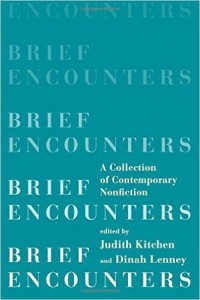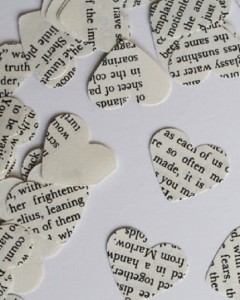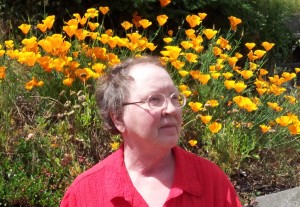Dinah Lenney and “Brief Encounters”
 After Brief Encounters: A Collection of Contemporary Nonfiction launched last November, we at Soundings were so excited by the number of contributors in the collection who are RWW faculty, current and past participants, or special RWW guests and award-winners, that we really wanted to feature the anthology to all of our readers. In the spirit of celebrating these different “brief encounters,” we asked a handful of RWW contributors what their favorite sentence from their own piece was, and then to provide a brief statement on why. Following the interview with the collection’s co-editor, Dinah Lenney, are nine of these micro-craft essays by RWW contributors Bill Capossere (2009), Nancy Geyer (2013), Emily Holt (2016), M.J. Iuppa (2006), Rebecca McClanahan, Brenda Miller, Dinty Moore, Scott Nadelson, and Peggy Shumaker.
After Brief Encounters: A Collection of Contemporary Nonfiction launched last November, we at Soundings were so excited by the number of contributors in the collection who are RWW faculty, current and past participants, or special RWW guests and award-winners, that we really wanted to feature the anthology to all of our readers. In the spirit of celebrating these different “brief encounters,” we asked a handful of RWW contributors what their favorite sentence from their own piece was, and then to provide a brief statement on why. Following the interview with the collection’s co-editor, Dinah Lenney, are nine of these micro-craft essays by RWW contributors Bill Capossere (2009), Nancy Geyer (2013), Emily Holt (2016), M.J. Iuppa (2006), Rebecca McClanahan, Brenda Miller, Dinty Moore, Scott Nadelson, and Peggy Shumaker.
Chelsey Clammer: In your introduction to Brief Encounters, you say that you wish the book could be retitled Meaningful Encounter or Continuous Encounter. I feel like part of the reader’s engagement with these encounters is just that—they aren’t only meaningful, but they’re also continuous in the sense that we will remember them, that we’ll take these encounters with us wherever we go. (For instance, I won’t ever be able to board a plane again without thinking about Sven Birkerts’s sentence.) What are some of the encounters or “moments” you came across while putting this collection together that have become a continuous and/or meaningful part of your life?
Dinah Lenney: Well, first, let me explain what I meant when I wrote about retitling the book in the singular: see, I’d never worked on an anthology before, so I didn’t know how attached I’d become to the way it hangs together—hopefully, it’s as good as (greater, even!) than the sum of its parts. Of course, that won’t be true for most readers—most will be able to easily pick and choose particular favorites. But having collected them all in one place, I’m interested in the arrangement of the whole shebang: in the way the essays talk to each other; in how one piece brings on the next and why (it could have to do with a single word or phrase or idea or relationship), the notion being that if you read the book from cover to cover it would make for one long encounter, right? But okay, most people won’t read that way—rather, they’ll skip around—which, of course, I’ve also been known to do. I’ve gone back to every piece again and again. My particular touchstones, today? Judith Kitchen’s “Who.” Hilton Als’s “Fats.” Lynne Sharon Schwartz’s “The Renaissance.” Barbara Hurd’s “Cocoons” and Anika Fajardo’s “What Didn’t Happen.” And Lawrence Weschler’s “Motes in the Light.” And Stuart Dybek’s “Between”— but please ask me again tomorrow, okay?
CC: Some of the essays in the collection are more than just creative essays, but also at times read as craft essays. For instance, in Patrick Madden’s “Dispatch from Montevideo,” he says, “We are a pattern-finding species, perhaps none of us more so than the essayists, whose job it is to corral bits of raw experience into meaning without inventing rounded scenarios and uncanny coincidences. Our imaginations don’t supply the materials, but they make the connections.” As an essayist, this obviously speaks true to me. I’m curious about how true this statement applies to your process as editor as you solicited and organized the essays in Brief Encounters. What sorts of connections did you find yourself making among these pieces?
DL: Ah ha, okay, yes—that was the fun part. (Orchestrating a continuous encounter!) Not surprising that so many of us write about family and legacy and home. But there are other threads to pull: about music, and art, and color, and games and sport, and animals and nature (the natural world); about the city—about violence and disaster and loss. About witnessing and listening and looking. And yes, about reading and writing. Lots of us write about writing—some overtly, others less so.
CC: The diversity of the writers, styles, themes, and stories presented in this book is impressive and marvelous. What were some of the challenges you faced while curating this collection in regards to deciding on what to include and/or where to put it?
DL: First off, we didn’t solicit submissions—rather we went after writers and writings we already loved. And we never chose a piece only because it worked with something else—it had to work all by itself, first. Most important to us was that the selections be various in terms of content, tone, perspective, style. We wanted to represent the form in the current moment; to prove its capaciousness; to indicate that the possibilities are endless and endlessly entertaining.
CC: This, sadly, was Judith Kitchen’s last book to edit. What was it like to work with her on it?
DL: How’d I get so lucky, right? Judith was so smart, generous, clear-thinking, insightful, practical, organized, knowledgeable, inspired, enthused, funny, adorable—did I say generous? Let me say it again, okay? She was generous. She taught me so much from every angle. I got lucky, I really did.
CC: During my first residency in 2013, I was in a workshop with you in which you discussed how each essay needs to have a question it is attempting to answer. That statement completely changed the way I look at essays and has greatly helped my own writing process (so thank you for that!). What question do you think this collection is attempting to answer?
DL: Such an interesting question—and I’d like to pass the buck. Very often readers turn out to know more than writers about this stuff; or at least readers are the first to figure it out. (So I’m wanting to turn this around and ask you!) But okay, on a practical level, one question we’re asking is, What are we thinking about? (What do we see and what does it mean? What do we want and what do we fear?) I’m riffing off Didion’s famous essay, of course —“Why I Write”—but really, we wanted to know: What moves us? What matters? And then, from a craft point of view: Can we locate those questions and preoccupations and obsessions—can we actually untangle them some way somehow (to our own satisfaction; to the point of discovery!) in a “short”?
CC: Finally, in the spirit of celebrating those “brief encounters” that strike Soundings staff most significantly, we’re asking RWW contributors what their favorite sentence from their own piece is and why. I was delighted to discover that your piece in the collection, “Future Imperfect,” is one that you read/presented/(perhaps even performed) at the 2014 residency. What’s your favorite sentence from this piece and why?
DL: I’m going to cheat here and choose a line I didn’t write; is that okay? It’s in the piece—it’s a quote from neuroscientist Antonio Damasio: “[Human beings] live every moment, every second of our lives poised between the lived past and the anticipated future.” My gosh, that is just so true. And what a predicament to be in, right? Under the circumstances, how not to try and grab onto the moments whenever, wherever, however we can.
***
RWW Contributors’ Favorite Lines and Why:
(All excerpts used by the permission of the authors.)
Bill Capossere (2009)
From “Chess Piece”
“Usually this low-key music was all the sound of the game, and as play entered into a rhythmic move and countermove—thud, thunk, slide, silence, thud, thunk, silence, slide—the hushed nature of it all lent the game a kind of gravitas, the pieces performing a muted dance of black and white, like a procession of nuns performing a sedate allemande in the chapel, their arms folded in their wide sleeves, the only sound the whisper of cloth and the occasional scuff of shoe on stone as they weave in and out, the disciplined stiffness of habit and face unable to hide the furtive pleasure, their fluid if serious grace.”
I thought for a few moments of choosing a nice clean sentence. Model of brevity, brief but effective, etc., etc. But who am I kidding? It was always gonna be the nuns. I like how the length mirrors the dance, its visual image of serene movement in monochrome, the secret that those stern faces and heavy clothes hide a sneaky joy, and the sound play of the words. It became its own little “essay within the essay” project, so much time working on it, and to be honest, it might be too much. I certainly reduced it greatly or even took it out completely a bunch of times. But they’re nuns. And they’re dancing. Who was I to deny them?
Nancy Geyer (2013)
From “Umbrellas”
My favorite sentence is actually a quote from Christopher Kennedy’s poem “The Porous Umbrella” (Encouragement for a Man Falling to His Death). It reads: “I stroll along with all the others, our umbrellas raised over our heads until the street becomes a garden of damp black flowers.”
I carried that gorgeous sentence around in my head for ages, and then I observed that not even in New York City do you see a preponderance of black umbrellas. Where was Kennedy’s dark garden? I wondered. And, thus, a mini-essay unfolded, traveling back in time and around the world—to Paris, to a valley somewhere in Japan, to southern California, to Arles—and returning home.
Emily Holt, (2016)
From “Hunger”
 “We’re indirect, all possibilities running off in rivers that splinter the country, because who would want to choose just one river?”
“We’re indirect, all possibilities running off in rivers that splinter the country, because who would want to choose just one river?”
This is actually a line that Judith Kitchen inspired. I wrote the essay not long after returning to Arklow for my grandmother’s funeral. During my first few nights in Ireland, and not long after I had read Distance & Direction, the only book that cut through the haze of grief and jetlag was The Circus Train. In the latter, in just a few lines and all at once, Judith made me laugh out loud, mirrored my self and my family back to me, and complicated that perception: “Irish charm, red-haired and rumpled. But at the heart of it all is something not so much inept as stubbornly imprecise: to choose is to close the number of options, to decide is to limit possibility.” I loved how she both used and undercut stereotype and got underneath the skin with such fine precision.
M.J. Iuppa (2006)
From “Clotheslines”
“Only in the early sixties, plastic coated wire lines were strung between two metal cross pipes set in cement, acting as a division between yards; but, in actuality, were a meeting place where mothers would air their thoughts & the neighborhood boys would race their Schwinns between the flap of Saturday’s sheets.”
It’s difficult to select a favorite single line in a lyric essay, because every line depends upon the other. However, this line captures a vivid scene from my childhood. Perhaps, cinematic in my memory, those mothers whispering to each other as that merry band of brothers raced their bikes between the flap of sheets. It was a tight community—a network that we counted on. In many ways, I miss the conspiracy of mothers—the way they knew everything.
Rebecca McClanahan (faculty)
From “Things Gone the Way of Time”
“Memory that hand-knotted string of pearls, that black locomotive spewing out smoke clouds, dragging its precious cargo in circles around the living room and over the uncoupling track with its power to disconnect everything we’ve snapped so carefully together, leaving the rest of our story stranded—the box car, the coal loader, the cartoon-red caboose signaling the end, the open platform asking to please be filled with something, oh please let it fill with something, we could name it the future, that all-thumbs, fumbling-in-the-dark set of hands whose touch we close our eyes to accept.”
I realize that this sentence, long though it is, is actually a sentence fragment, but I’m calling it a sentence anyway. It is the final one in the essay, one that expands on the brief sentence that precedes it, about the difference between memory and nostalgia. It’s my favorite because it surprised me when the image of the open platform (of the Lionel train set) appeared, an image that turned the essay on its head, shifting the narrator’s glance from a backward glance to a forward, future-facing one.
Brenda Miller (faculty)
From “Swerve”
“I’m sorry, I said, and I said it again, and we continued on our way through the desert, in the dark of night, with the contraband you had put in our trunk, with the brake light you hadn’t fixed blinking on and off, me driving because you were too drunk, or too tired, or too depressed, and we traveled for miles into our future, where eventually I would apologize for the eggs being overcooked, and for the price of light bulbs, and for the way the sun blared through our dirty windows and made everything too bright, and I would apologize when I had the music on and when I had it off, I’d say sorry for being in the bathroom, and sorry for crying, and sorry for laughing, I would apologize, finally, for simply being alive, and even now I’m sorry I didn’t swerve, I didn’t get out of the way.”
This sentence is half the essay, and I like it not only for its length (I adore long sentences), but because the length propels the speaker (and the reader) through the painful memory of the past into the present moment of forgiveness for the past. I’ve had copy editors who wanted to insert a few periods and make it several sentences, but I’ve always managed to get my way. In this case, the long sentence creates the momentum necessary to get to that turn at the end.
Dinty W. Moore (recipient of the 2011 Stanley R. Lindberg Editor’s Award)
From “If Mr. Clean Had Been My Father”
My favorite sentence is, in fact, the very first: “Sister Ann, my fifth-grade teacher, raised one eyebrow and pointed to the door after my name crackled across the school’s public address system.”
This one moment in time epitomizes the entirety of my first five years of grade school, a two-second-scene that seemed to repeat itself over and over and over, as nun after nun found me too distractible, too irreverent, or too sly. The storyteller in me likes the sentence because of the tension and suspense (I hope) it creates. And “crackled.” I like that word a lot.
Scott Nadelson (faculty)
From “Parental Pride”
“I probably didn’t think about it in quite those terms, but I did recall then, or maybe it was later, a fight I’d gotten into as a ten-year-old, the only one I’d ever instigated, though I’d been reluctantly drawn into plenty of others, usually by a sadistic neighbor who liked to beat me over the head with a rubber snake.”
“Parental Pride” progresses along a series of associative hinges, pivoting from observation to memory to reflection, and this sentence makes the first major turn. It was an important breakthrough as I was writing, moving me from the instigating event into an extended recollection. I especially like the way it begins with uncertainty and qualification—“probably,” “maybe”—before funneling down to the definitive, from fuzzy recall to a particular image of violence the speaker can’t forget.
Peggy Shumaker (faculty)
From “The Nun”
“The year I impersonated a nun, my marriage was falling apart.”
That sentence opens my piece in Brief Encounters. Judith Kitchen long ago asked several people to write about strange jobs they’d done. I wrote about working in a Catholic music publishing house, where I wrote liner notes for albums that hadn’t yet been produced. On the phone, people assumed I wore a habit. It was a peculiar, painful time in my failing marriage, a time of all kinds of questioning. Ultimately, Judith’s project never found a home. When she was putting together Brief Encounters, she asked to see this piece again, and she and Dinah kindly included it. I like the combination of weirdnesses in this sentence, the mix of humor and failure, the awareness that situations get away from us.
_
_


